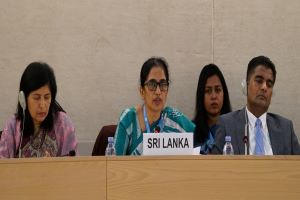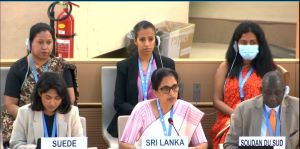
GoSL Statement made by H.E. Himalee Arunatilaka, the Permanent Representative of Sri Lanka to the United Nations in Geneva
54th Session of the Human Rights Council:
Report on Sri Lanka by the High Commissioner for Human Rights
pursuant to HRC Resolution 51/1
11 September 2023
Mr. President,
At the outset, let me reiterate that the Government of Sri Lanka (GoSL) has consistently rejected Resolution 46/1 and 51/1 that led to the setting up of the so-called ‘Accountability Project’. We also reject the written update, its conclusions and recommendations.
We recall that the majority of the Member States either opposed or abstained from voting on these Resolutions, in fundamental disagreement with its unacceptable content in particular the so-called evidence gathering mechanism, the establishment of which is unprecedented. We reiterate that it goes beyond the mandate that Member States conferred on the Council by UNGA Resolution 60/251.
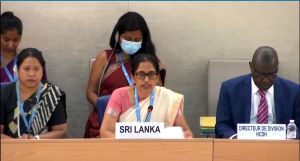
Mr. President
Excellencies
Distinguished Delegates
It gives me great pleasure to present to you the final position of the Government of Sri Lanka on the recommendations received during the 4th cycle of our UPR Report.
The mechanism of the UPR marks the culmination of a long review process of the international human rights machinery. We value the fact that this mechanism provides an equal opportunity for all UN member States, without discrimination, to voluntarily share the progress made domestically to promote and protect human rights. This peer review process has contributed to reducing selectivity and politicization in our efforts to advance the cause of human rights. It enables constructive engagement on developments related to human rights with our international partners, national independent institutions, civil society, and the UN system.

Mr. President,
The Government of Sri Lanka is addressing the unprecedented social and economic issues arising from the economic crisis. Political stability has been restored while conditions on the ground have improved considerably for the people. In parallel and despite ongoing fiscal challenges, the Government is continuing its focus on the long-term measures towards reconciliation and accountability within the framework of the Constitution.
The GoSL has been successful in maintaining economic stabilization. The IMF Extended Fund Facility for Sri Lanka was approved recently, and the necessary fiscal, monetary and governance reforms are underway. Social protection measures to mitigate the impact on the poor and vulnerable have also been introduced. The availability of essential items including fertilizer, fuel, medicine and energy has been restored and headline inflation has decreased.
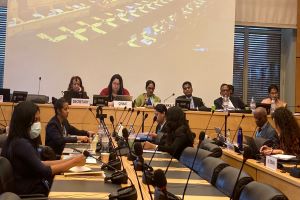
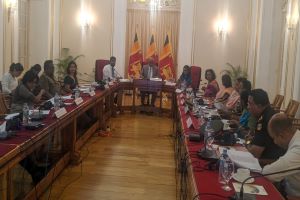
Sri Lanka participated in its 6th Periodic Review under the International Covenant on Civil and Political Rights (ICCPR) on 8 and 9 March 2023in Geneva. The Review was conducted in a hybrid format, during three 2-hour sessions over two days by the Human Rights Committee. The preparations for the Review were led by the Ministry of Foreign Affairs over the past several weeks and included participation by a number of government agencies.
The Human Rights Committee is a body comprised of 18 independent experts that monitor the implementation of the ICCPR. The Reviews of all States Parties to the Covenant are conducted by the Committee. In addition to Sri Lanka the Committee also reviewed Egypt, Turkmenistan, Zambia, Peru, and Panama during its 137th Session from 27 February to 24 March 2023.
In her opening statement, the Head of the Sri Lanka Delegation Permanent Representative of Sri Lanka to the UN in Geneva Ambassador Himalee Arunatilaka, said that since the submission of Sri Lanka’s 6th Periodic Report in 2019, many significant developments in the country have taken place, including the enactment of the 21st Amendment to the Constitution, further strengthening democratic governance through the Constitution, Regulation of Election Expenditure Act, amendments to the Prevention of Terrorism Act and drafting of anti-terrorism legislation, reconciliation through independent domestic mechanisms, convening of an All Party Conference, establishment of a Cabinet Sub-Committee on Reconciliation and release of land held by military for security purposes in the North and the East to the legitimate owners. Ambassador Arunatilaka also pointed out that the period under review posed unprecedented socio-economic challenges for Sri Lanka and the Government’s main objective during the past year was to restore economic and political stability and on delivering urgent socio-economic necessities.
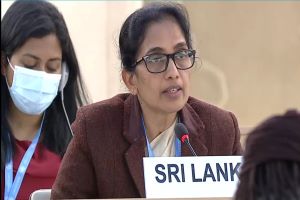
Mr. President,
Distinguished delegates,
I take the floor in keeping with Sri Lanka’s continuing policy of constructive engagement with the UN human rights instruments and mechanisms.
As we mark the 75th anniversary of the UDHR, and the 30th anniversary of the Vienna Declaration and Programme of Action (VDPA), we must resolve to preserve the spirit of multilateralism and the foundation of human rights governance. We must also strive to depoliticize human rights and find solutions to concerns through dialogue and multilateral cooperation rather than through confrontation, selectivity and unilateralism.
Mr. President,
We envisage 2023, the 75th anniversary of our independence, which coincides with the 75th Anniversary of the adoption of the Universal Declaration to be a year of socio-economic stabilization, reconciliation, and recovery.
The domestic institutions for reconciliation and accountability in Sri Lanka continue to carry out their work towards achieving important post-conflict recovery and healing.
A Cabinet Sub-Committee has been established under the Chairmanship of the President, to promote reconciliation among different communities and to address and resolve matters relating to issues encountered by the peoples of the Northern and Eastern Provinces.
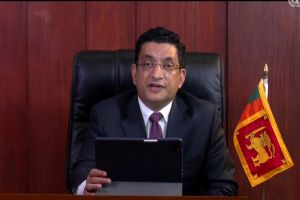
Sri Lanka concluded its 4th Cycle of the Universal Periodic Review (UPR) during the 42nd Session of the UPR Working Group on Wednesday 1st February in Geneva. Sri Lanka’s National Report was prepared by the Ministry of Foreign Affairs with input from government ministries and agencies through an inclusive and broad-based process where civil society organizations and the National Human Rights Commission of Sri Lanka were also consulted.
The UPR is conducted as a review mechanism by the UPR Working Group of the UN Human Rights Council in four year cycles. Sri Lanka’s last UPR review was in 2017.
Delivering the opening statement via a pre-recorded statement, the Head of Delegation, Foreign Minister Ali Sabry highlighted the progress and achievements made by Sri Lanka since its last review including the implementation of the recommendations accepted. Sri Lanka envisages 2023, the 75th anniversary of independence, to be a year of socio-economic stabilization, reconciliation, and recovery. The Minister also said that “it is important to learn from the past, and it is equally important to move on, to build better and stronger.”
The Permanent Representative to the UN in Geneva Ambassador Himalee Arunatilaka highlighted legislative and policy measures implemented by Sri Lanka during the reporting period including the 21st Amendment to the Constitution, strengthening efforts on the reconciliation processes and the national independent institutions.

Sri Lanka concluded its Review under the 4th Cycle of the Universal Periodic Review (UPR) in Geneva, today.
Foreign Minister Ali Sabry, as the leader of the Sri Lanka delegation, delivered the remarks through a pre-recorded video statement.
Ministry of Foreign Affairs
Colombo
1 February, 2023
.....................................
Pre-recorded video statement by the Hon. Minister of Foreign Affairs Fourth Cycle of the Universal Periodic Review of Sri Lanka
Geneva, 1 February 2023
Mr. President,
Excellencies,
Distinguished delegates,
It is a privilege for me to welcome all of you to Sri Lanka’s Review under the fourth cycle of the Universal Periodic Review.
The year 2023 is a milestone for the global human rights architecture. We are celebrating the 75th anniversary of the Universal Declaration of Human Rights and also the 30th anniversary of the Vienna Declaration and Programme of Action. The mechanism of the UPR marks the culmination of a long review process of the international human rights machinery. We value the fact that this mechanism provides an equal opportunity for all UN member States, without discrimination, to voluntarily share the progress made domestically to promote and protect human rights. This peer review process has contributed to reducing selectivity and politicization in our efforts to advance the cause of human rights. It enables constructive engagement on developments related to human rights with our international partners, national independent institutions, civil society, and the UN system.
- Statement by the Minister of Foreign Affairs of Sri Lanka at the 51st Regular Session of the United Nations Human Rights Council in Geneva on 12 September 2022
- Foreign Minister meets High Commissioner for Human Rights on the side lines of 50th Session of the Human Rights Council
- Statement by the Minister of Foreign Affairs of Sri Lanka at the 50th Regular Session of the United Nations Human Rights Council in Geneva on 13 June 2022

